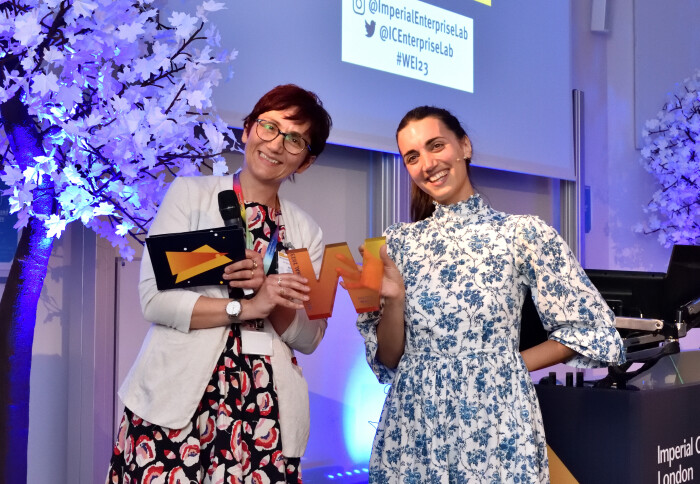Matrix wins top prize in Imperial’s competition for women-led startups

An Imperial student startup has developed a self-use pelvic assessment tool and diagnosis device, supported by AI.
Matrix, a self-use cervical assessment tool, designed with patient comfort and wellbeing in mind, has been awarded the top prize of £15,000 in Imperial College London’s WE Innovate programme.
Tackling healthcare issues
Stilliyana Minkovska, Imperial alumni and health tech entrepreneur, is developing a device which can be inserted by patients to collect samples while a camera photographs cervical cells. She describes the device as a replacement for the speculum “which has barely changed since the Roman era."
This comes at a time when ‘no shows’ for cervical screening are at a 10-year high. A survey by the Department of Health and Social Care found embarrassment was the most common reason for not booking a cervical screening.
Stiliyana hopes this will “increase uptake of life-saving treatments” and ultimately improve the prognosis of cervical cancer.
The tool also has the capability to screen for STIs, including cervical warts and could be used for reproductive assessments.

WE Innovate
WE Innovate is an entrepreneurship programme run by Imperial Enterprise Lab designed to inspire and accelerate the progress of women-led startups. At the in-person final, five finalists went head-to-head in the hope of winning a share of a £30,000 prize pot.
Previous winners of WE Innovate include a water quality monitoring tool for fish farmers, a blood tracking tool to diagnose gynaecological problems earlier, and a wastewater disease surveillance tool.
Runners up
Guerilla, co-founded by Summer Chen, was awarded second prize of £7,000 for her roadside drainage system that captures and removes pollution before it enters water systems.
The third prize of £5,000 was awarded to Carbon Cell, a carbon neutral replacement for polystyrene packaging which is made from waste products, and was co-founded bv Elizabeth Lee.
The runners up, each awarded £1,500, are AiKNIT, an adaptable ‘glove’ to promote faster and more effective healing in muscular disorders like arthritis and Aloe Health, a mental health assessment tool for parents.
Further awards
AiKNIT also received the Lauren Dennis Award; in memory of an incredible WE Innovator, this prize is awarded to the team demonstrating an exceptional entrepreneurial spirit in STEM. The recipient benefits from a 4-week fellowship with Become a Science Founder (BSF) by Wilbe.
PCOSENS received the Engineers in Business Award, which offers £3,000 in grant funding, mentorship and a professional CV package for entrepeneurs spanning engineering sciences, sponsored by Engineers in Business Fellowship.
Article text (excluding photos or graphics) © Imperial College London.
Photos and graphics subject to third party copyright used with permission or © Imperial College London.
Reporter
Bryony Ravate
Communications Division